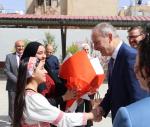You are here
Elections and demography
Mar 16,2015 - Last updated at Mar 16,2015
Not long ago, prominent Israeli novelist and writer Amos Oz warned that barring a two-state solution to the long-standing Israeli-Palestinian conflict, Israel will run the risk of either becoming a dictatorship ruled by fanatic Jews or an Arab state inside Israel.
To ward off either outcome, Oz argued that Israel should cast aside the tactics of managing the conflict and instead help implement the two-state solution.
This is not the first time that intellectuals come up with such arguments. One can easily find a plethora of articles, books and pamphlets making the same point.
Those in Israel who support the two-state solution are driven by the same logic. Indeed, when the “Jordanian option” was first floated, in the aftermath of the 1967 war, by top leaders of the Labour Party, they were influenced by the powerful logic of this argument.
Even today, many Israelis support the two-state solution as the optimal way to avert the transformation of Israel into a bi-national state whereby Jews become a minority.
Israelis cast their votes today to elect a new Knesset. The two-state solution issue is not dominant in the public debate. Competing candidates focus on the issue of security, particularly after Prime Minister Benjamin Netanyahu devoted all of his most recent speech before the US Congress to warn against Iran’s nuclear programme and the perils involved in what he characterised as a “bad” deal with Iran.
Unfortunately, many Israeli voters have been brainwashed into believing that there is no one to talk to on the Palestinian side. They believe that while Israelis are willing to put an end to the conflict, Palestinians are not yet ready to embrace the reality and come to term with the logic of the two-state solution.
It is the same argument that has been employed by all successive Israeli leaders to justify the continuation of the status quo.
For those at the helm of politics in the current Israeli government, the stalemate is not hurting both sides.
Israeli right-wing candidates are more interested in landgrab than in making peace. Making peace means that Israel will not be able to expand. To preempt any prospect for peace, they push the fear bottom.
To Oz, this is nothing but fear mongering.
In this context, it is worth quoting Oz at length: “The same fearmongers who frightened us with the Soviet army at the gates of Kfar Sava are now scaring us again, saying that if we withdraw from the territories, missiles will strike Tel Aviv, Ben-Gurion International Airport and Kfar Sava. I don’t know for certain whether that is true, but I can tell you, with the full authority of a staff sergeant in the Israel Defence Forces: It is already possible today to strike the airport, Tel Aviv and Kfar Sava with missiles, not only from Qalqiliyah but also from Iraq, from Pakistan and maybe even from Indonesia.”
The current public debate in Israel is not giving a healthy sign that the next government — regardless of who is in the driver’s seat — will act differently.
I do not see the next prime minister of Israel do what, for instance, Egyptian president Anwar Sadat did when he stunned the world with his move.
A step like Sadat’s entails a leadership that does not exist in Israel these days.
For years to come, Israeli politicians will be obsessed with the same mantra of the need to enjoy security before thinking of making peace. And yet, the sequence of peace and security looks absent from the public debate.
I followed Israeli elections for three decades. With minor exceptions, Israeli elections did not produce a marked difference in the final analysis.
As time goes by, less land remains for the Palestinians, more settlers live on Palestinian land, and peace became more of a mirage than reality.
In less than a decade to come, what Oz said might become a reality.












